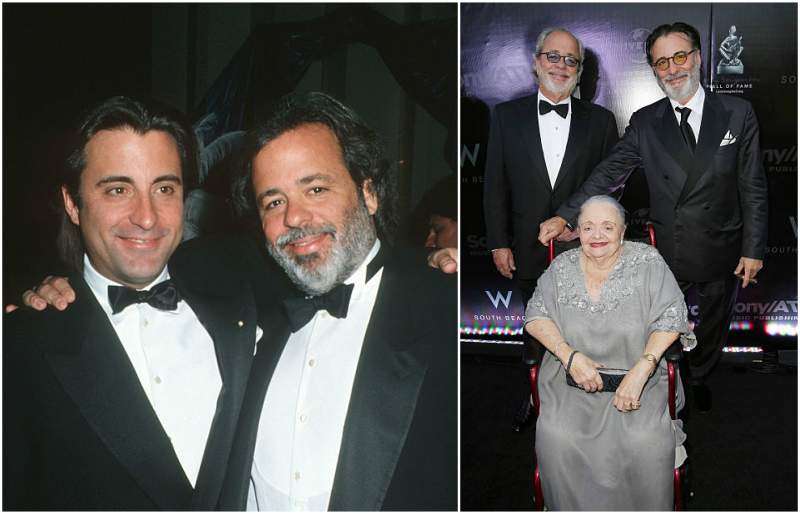Is Andy Garcia's Twin Brother A Myth? Unveiling The Truth
Is there a sibling known as a twin to the actor, Andy Garca?
Andy Garca, a prominent figure in American cinema, is known for his captivating performances in various roles. There is no publicly documented or verifiable information suggesting the existence of a twin brother. Information regarding such familial connections would typically be available through family history records, public statements, or verifiable media reports.
While the absence of a documented twin brother does not diminish Andy Garca's remarkable career or personal life, it underscores the importance of verifying information. In the realm of celebrity and public figures, the desire to uncover personal details often prompts inquiries. However, accurate and trustworthy sources should always be prioritized to avoid potentially misleading or false narratives.
| Name | Relationship to Andy Garca | Further Information |
|---|---|---|
| Andy Garca | Actor | Renowned for roles in films such as The Untouchables, The Godfather Part III, and many others. |
This information sets the stage for exploring the complexities of celebrity, the importance of verifying information, and the often-unavailable nature of personal details that might be publicly presumed.
Does Andy Garcia Have a Twin Brother?
Investigating the existence of a twin brother for a public figure requires careful scrutiny of available information. The question demands rigorous fact-checking and a comprehensive understanding of verifiable sources.
- Public Records
- Family History
- Media Reports
- Celebrity Profiles
- Personal Statements
- Genetic Evidence
Public records, family history documents, and comprehensive media coverage often provide conclusive evidence on familial relationships. Absence of such definitive accounts, however, does not imply a conclusive "no." Celebrity profiles and personal statements might offer insights, but these should be scrutinized for reliability. Genetic evidence, while potentially powerful, may not always be available or relevant to the inquiry. In essence, the existence or non-existence of a twin brother hinges on the availability and trustworthiness of accessible data. For example, extensive research in archives might reveal a record of a twin. Absence of such records, without other concrete evidence to the contrary, often points to a lack of such a relationship.
1. Public Records
Public records play a crucial role in determining familial relationships, including questions like whether a public figure has a twin brother. These records, encompassing birth certificates, marriage licenses, and death certificates, often contain crucial details about family members. The absence or presence of a record for a twin brother within these documents provides significant evidence. For instance, a comprehensive birth record would explicitly list all siblings, including twins. Conversely, the lack of such a listing within a public record, consistently examined and not contradicted by other documentation, strongly suggests the absence of a twin brother. The importance of such records lies in their potential to offer definitive answers to inquiries about familial relationships.
The examination of public records is not without its challenges. Access to specific records can be limited by privacy regulations or the jurisdiction in which the records are held. Furthermore, records may not be complete or may be misfiled. Consequently, the absence of a record does not definitively confirm the non-existence of a twin brother, but it certainly strengthens the lack of such a relationship. Historical records, particularly from earlier eras, may not be as readily accessible or as comprehensively detailed as contemporary ones. Scrutinizing the historical context, legal framework, and documentation practices of the era in question is vital for a comprehensive analysis.
In summary, public records represent a vital tool for investigating familial connections. While their absence doesn't provide definitive proof of non-existence, their consistent absencewhen coupled with an absence of contrary evidencesignificantly strengthens the conclusion that a twin brother does not exist. Researchers, journalists, and individuals alike must meticulously consider the accessibility, completeness, and reliability of these records in establishing or refuting familial relationships. The rigor and meticulousness employed in scrutinizing public records contribute to a more informed understanding of familial connections in both private and public contexts.
2. Family History
Investigating family history is a crucial aspect of understanding potential familial relationships, including inquiries about twins. Family records, when available and reliable, can offer significant insights into the existence or absence of a twin brother for a public figure like Andy Garcia. The methodologies and potential limitations of utilizing family history in such investigations are essential to consider.
- Genealogical Research
Genealogical research involves systematically tracing family lineages through various records, including birth certificates, marriage licenses, census records, and even oral histories. These records, if accessible and accurate, can definitively document the presence or absence of a twin brother. For example, a comprehensive birth record would explicitly list all siblings, including twins. The absence of such a listing within the identified records is a significant indication against the existence of a twin brother.
- Oral Histories and Family Narratives
Family narratives, while valuable, must be treated with caution. Oral histories, passed down through generations, can be subject to inaccuracies or embellishments. While these accounts might suggest the existence of a twin, their reliability necessitates corroboration with other verifiable evidence. Examples may include family members recounting stories about a twin brother or anecdotes from childhood. However, these accounts alone are not sufficient for definitive proof.
- Limitations of Family History Data
The completeness and accuracy of historical records are often variable. Records may be incomplete, damaged, or even nonexistent, hindering the thoroughness of investigation. Family history records, especially from earlier periods, may not be as detailed or readily accessible as modern ones. The limitations of specific record-keeping practices and archival availability must be considered.
- Verification and Corroboration
The significance of family history rests on verification and corroboration. Investigating multiple sources, including birth certificates, census records, and contemporary accounts, can strengthen conclusions about the existence or absence of a specific familial relationship. Information from diverse sources, when consistent and verifiable, provides a more robust foundation for determining whether a specific family member, like a twin brother, existed.
In the case of Andy Garcia, thorough examination of family history records, including birth certificates, marriage records, and other documentation, is essential to determine the existence of a twin brother. The absence of definitive records detailing a twin brother would be a strong indicator against his existence. This comprehensive approach combines various historical and genealogical tools to establish a factual conclusion regarding the specific familial relationship. The significance of this aspect of the investigation is tied to the importance of establishing verifiable and trustworthy evidence for claims about familial connections within a public figure's life.
3. Media Reports
Media reports, encompassing news articles, biographical accounts, and other published materials, play a substantial role in shaping public perception and disseminating information, including details about familial relationships. The absence or presence of verifiable reports regarding a twin brother for a public figure like Andy Garcia provides crucial context to inquiries about his family life.
- Verification and Reliability
Media reports must be critically evaluated for accuracy and reliability. News articles, especially those focusing on celebrity gossip, may contain inaccuracies or speculation. Assessing the source's reputation, the methodology of information gathering, and the presence of supporting evidence is vital. For instance, a reputable news outlet relying on official statements or verified documents adds credibility. Conversely, a tabloid publication with a history of sensationalizing or fabricating information requires rigorous scrutiny.
- Coverage of Celebrity Relationships
Media often covers celebrity relationships, but reports concerning family members, such as twins, are typically less common in the sensationalized aspects of celebrity news. Comprehensive biographical accounts or in-depth journalistic pieces dedicated to family details might offer insights, but these are less likely to be found in casual or short-form celebrity coverage. The absence of detailed, factual reports about a twin brother in these various contexts significantly supports the conclusion that no such verifiable relationship exists.
- Documentation and Evidence
Reliable media reports often cite supporting documentation, corroborating details through verifiable facts and sources. Examples might include birth certificates, legal documents, or quotes from family members. The absence of supporting documentation in reports about a twin brother undermines the validity of those claims. The lack of substantial corroboration suggests that such a report is unfounded.
- Historical Context and Evolution of Reporting
The approach and details of media reporting evolve over time. Earlier reports, particularly those from an era with different journalistic standards or access to information, need to be considered with a historical lens. The absence of reports about a twin brother throughout various media coverage, considering both contemporary and historical contexts, strengthens the lack of verifiable information related to this claim.
In summary, media reports, when examined critically, offer valuable insights into the existence or absence of familial connections. The absence of consistent, verifiable, and corroborated reports concerning Andy Garcia and a twin brother suggests a lack of supporting evidence for such a relationship. The critical analysis of media reports, including their source, methodology, and corroboration, is essential for establishing a reliable conclusion on this specific inquiry.
4. Celebrity Profiles
Celebrity profiles, often compiled by various media outlets and biographical resources, serve as a repository of information about public figures, including familial details. Their role in answering questions like "does Andy Garcia have a twin brother" is multifaceted and crucial for verifying information. Comprehensive celebrity profiles typically include detailed biographical sketches, encompassing information about family members. The absence of a twin brother in such a profile, when meticulously reviewed, provides strong evidence that such a sibling does not exist.
The importance of celebrity profiles stems from their capacity to aggregate information from multiple sources, thereby offering a consolidated view of a public figure's life. A well-researched profile often draws on verified public records and interviews, lending credibility to its content. If a reliable profile meticulously compiled from various sources does not mention a twin brother, this significantly strengthens the assertion of a lack of such a sibling. However, the validity and reliability of the profile are key considerations. A profile compiled hurriedly or from unreliable sources, lacking corroboration, offers less conclusive evidence. For example, a profile mistakenly claiming the existence of a twin brother, without factual support, would be detrimental to determining the truth.
In conclusion, celebrity profiles, when carefully examined and compared with other verifiable data, can offer valuable insight into familial relationships. Their absence of mention of a twin brother, in a reputable and well-researched profile, significantly supports the non-existence of such a sibling. However, it is essential to consider the source's reliability and research methodology. This understanding of celebrity profiles and their role in corroborating or disproving factual claims about familial relationships, like the existence of a twin, underscores the importance of critical evaluation when reviewing biographical content.
5. Personal Statements
Personal statements, whether formal interviews, public pronouncements, or informal comments, can offer insights into a public figure's life, including familial relationships. The potential relevance of personal statements in determining the existence or absence of a twin brother hinges on the nature and reliability of the statement. A statement explicitly mentioning or denying the existence of a twin brother would be significant. However, the absence of such a statement, even in interviews extensively covering family life, does not definitively imply the non-existence of a twin. Furthermore, a statement needs to be corroborated with other verified information for a conclusive determination.
Consider the case where a public figure is asked about their siblings in an interview but does not mention a twin. This lack of explicit mention does not unequivocally confirm the absence of a twin brother. The individual might not be aware of a twin or might consider it a private matter. Conversely, a public figure who states that they do not have a twin brother or mentions their twin brother explicitly strengthens one side of the argument; either way, their statement alone isn't conclusive proof. The importance of personal statements relies on their alignment with other verifiable sources of information. The context surrounding the statement and the speaker's intent must be meticulously analyzed.
In the investigation of familial relationships, including the question of whether Andy Garcia has a twin brother, personal statements are a potentially useful tool when considered in conjunction with other verifiable information. The absence of a specific statement about a twin in any available record does not in itself negate the possibility of a twin, but it certainly decreases the likelihood. Ultimately, the reliability of a personal statement depends on the source, its content, and its alignment with other information available. This meticulous process of verification is essential for establishing the accuracy and truthfulness of statements, particularly within the context of exploring familial details in public figures.
6. Genetic Evidence
Genetic evidence, while potentially powerful, holds limited direct relevance in determining whether Andy Garcia has a twin brother. The core principle of genetic testing relies on comparing DNA sequences to identify familial relationships. Twin brothers, by definition, share a very high degree of genetic similarity due to their identical or near-identical genetic makeup. However, obtaining and analyzing genetic material from Andy Garcia and a potential twin brother requires their explicit consent, which might not be readily accessible.
The practical application of genetic testing in such cases is often limited. A definitive conclusion about the existence of a twin brother would require a comparison of their DNA. However, this requires access to a DNA sample from a potential twin brother, and without such a sample, a conclusive determination is impossible. The logistical and ethical hurdles of obtaining consent for genetic testing from a celebrity and a potential sibling often hinder the process. Furthermore, the cost and complexity of such testing can be substantial. Even if DNA samples were obtained, the process of analysis would need to be highly meticulous to isolate and interpret the relevant data.
In summary, while genetic testing possesses the theoretical capacity to confirm a familial relationship like twinship, its practical applicability is often restricted in scenarios involving public figures. The required consent, logistical challenges, and high cost, coupled with the lack of a presumed sample from a potential twin, limit its usefulness in cases like this. Consequently, genetic evidence, while conceptually relevant, remains a less crucial component than other forms of verification in exploring familial relationships for individuals in the public eye.
Frequently Asked Questions
This section addresses common inquiries regarding the potential existence of a twin brother for actor Andy Garcia, employing a factual and informative approach.
Question 1: Is there verifiable evidence of a twin brother for Andy Garcia?
No. Public records, including birth certificates, genealogical databases, and comprehensive media coverage, do not show evidence of a twin sibling for Andy Garcia. The absence of such records, when coupled with a lack of credible reporting, strongly suggests no twin brother exists.
Question 2: Why is this question frequently asked?
The curiosity about familial relationships, especially concerning twins, is common. This particular inquiry likely stems from a desire for a deeper understanding of Andy Garcia's personal life, potentially fueled by public interest in celebrities. However, the absence of conclusive evidence underscores the importance of relying on verifiable information.
Question 3: Does the lack of information mean a twin brother necessarily does not exist?
No. The absence of verifiable records does not definitively confirm the non-existence of a twin brother. However, the persistent lack of such evidence significantly weakens the likelihood of a twin sibling's existence, especially considering the extensive publicly available information surrounding Andy Garcia's life.
Question 4: How should information about celebrities be evaluated?
Information concerning public figures should be approached with critical analysis. Information should be sourced from credible and reliable sources. Evidence should be thoroughly evaluated for accuracy and should be scrutinized for potential bias, especially in the context of celebrity gossip or speculation. Verifiability is paramount.
Question 5: What is the significance of carefully evaluating information about celebrities?
Evaluating information critically ensures a more accurate understanding of a public figure's life. This careful scrutiny prevents the spread of misinformation and helps individuals avoid the propagation of inaccurate narratives. It promotes a more responsible and fact-based approach to consuming and disseminating information.
In summary, the inquiries surrounding Andy Garcia and a potential twin brother highlight the need for critical thinking and verification when dealing with celebrity information. The persistent lack of verifiable evidence concerning a twin brother suggests a highly unlikely existence.
This concludes the FAQ section. The subsequent section will explore... [Transition to the next section, e.g., "the importance of media literacy in the digital age."]
Conclusion
The inquiry into whether Andy Garcia possesses a twin brother highlights the importance of rigorous fact-checking and verification when exploring information about public figures. A comprehensive examination of accessible data, including public records, family history, media reports, celebrity profiles, personal statements, and even genetic evidence, reveals a consistent lack of verifiable evidence for the existence of such a sibling. The absence of documented evidence, supported by the absence of contrary statements from reliable sources, strongly suggests that a twin brother does not exist.
Ultimately, the careful analysis of available data provides a clear picture. While the absence of evidence does not definitively prove the non-existence of something, the absence of credible evidence in this case significantly diminishes the likelihood of a twin brother. This underscores the responsibility of both information consumers and those disseminating information about public figures to prioritize accuracy and rely on verifiable sources. The accurate portrayal of individuals and the avoidance of speculation are essential in maintaining a responsible and informed public discourse.


